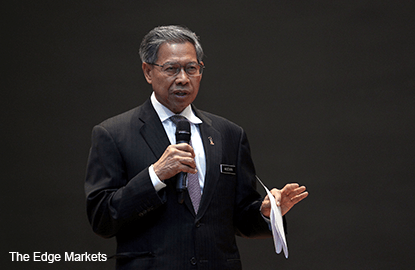
(Nov 13): Despite saying that it was a “win-win” situation for all countries in the Trans-Pacific Partnership Agreement (TPPA), Putrajaya admits that locally, there will be “winners and losers” due to the controversial pact.
International Trade and Industry Minister Datuk Seri Mustapa Mohamed, however, said the benefits from entering into TPPA outnumbered its disadvantages.
Mustapa said this in a statement today, declined to elaborate who these winners and losers were or the benefits and disadvantages.
He has in the past promised that these would be revealed in a cost-benefit analysis to be published in 10 days.
“The ministry realises that there will be winners and losers from joining TPPA.
“As a country that practices an open economic policy, the government believes that the benefits of entering TPPA outnumber its disadvantages,” Mustapa said.
Putrajaya has received a lot of praise, and brickbats, for agreeing to join the United States-driven TPPA, which comprises 11 other countries.
If Malaysia signs it next year, it would have access to a market with 800 million consumers and an economic output or Gross Domestic Product (GDP) of US$28 trillion (RM122 trillion).
The pact goes beyond a traditional free trade agreement (FTA) which lowers trade barriers such as duties and taxes. The TPPA also promises to rewrite laws on how all member countries do business.
Its proponents claim Malaysian electronic, rubber, textile and oil palm products will get access to new customers and markets.
“Malaysian products will get access to markets which we don’t have existing FTAs which are the US, Canada, Mexico and Peru,” said Mustapa.
But its critics said the prices of medicines will go up and that local Malay-owned and government-linked companies will no longer be protected.
“Membership in the TPPA does not mean that bumiputera institutions such as MARA and TERAJU will be sidelined,” Mustapa said in his statement.
Putrajaya has also been accused of opening the country up to a new form of US-centred colonialism.
“Mustapa refuted this point by saying that Malaysian companies such Petronas, Axiata, Sime Darby, the UEM Group are already operating in many foreign countries.
Yet, this did not mean that these countries were being colonised by Malaysia.
“In reality, up till June 2015, Malaysian investments in foreign countries totalled RM522 billion, more than the RM477 billion that is being invested here by foreign companies,” Mustapa said.
“But the presence of our companies and professionals in foreign countries does not mean that we are colonising those countries.”
The Malaysian market is too small and businesses and professionals have for a long time started going overseas including in TPPA countries such as Australia, New Zealand, Singapore and Brunei, he said. – The Malaysian Insider